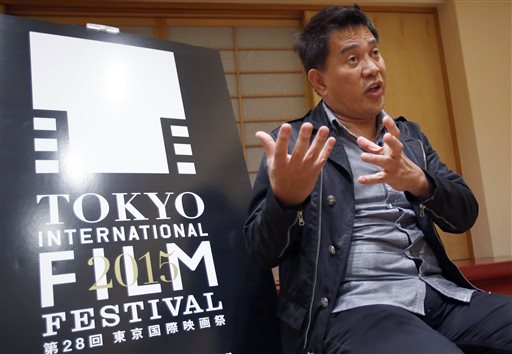Brillante Mendoza honored at Tokyo film festival
TOKYO — Filipino director Brillante Mendoza, taking center stage at the Tokyo International Film Festival, is pursuing a collaboration with other Asian filmmakers — a cultural connection that might be as simple as rice.
The festival, which opened Thursday with red carpet ceremonies, features five films directed by Mendoza, including his latest “Taklub,” shown earlier this year at Cannes. Two films he has produced are also being shown.
Mendoza has already started preliminary discussions with Isao Yukisada of Japan and Cambodian Sotho Kulikar for a film to be shown at next year’s Tokyo festival.
The prevalence and deeper meaning of cooking and family meals in Asian life — and in Asian films — has already come up as one commonality, he said.
“We would like to maximize the connection,” Mendoza said in an interview at a Tokyo hotel.
Article continues after this advertisementThe festival’s opening film is “The Walk,” about French tightrope daredevil Philippe Petit, directed by Robert Zemeckis, who is among the 400 people attending the opening.
Article continues after this advertisementHillary Swank, who portrays a woman with a fatal illness in “You’re Not You,” and Helen Mirren, of “Woman in Gold,” also walked the red carpet for the festival, which closes Oct. 31.
Mendoza, who has won awards at Cannes, Berlin and Venice, is a rare but powerful voice of independent cinema in a region dominated by sappy melodrama and Hollywood.
His films are poetically dark, following prostitutes, midwives and poor mothers in back alleys of a slum, spiraling staircases and typhoon-torn beaches. The sometimes shaky hand of his camera gives it a voyeur feel, disguising the certainty of his storytelling.
His characters endure hardships — a devastating typhoon in one, the heartbreaking death of a child in another — often shot in the gorgeous landscapes of the Philippines. The plot is never a simplistic pitting of good versus bad, as in many Hollywood action films.
Mendoza’s people are hardworking, humble, everyday people. But they are sometimes weak, betraying a partner’s love or simply giving up.
“We can all commit mistakes, but committing a mistake doesn’t make us a bad person,” he said. “I think that is what makes us really human. Rising up above these mistakes — that is the best part, when you learn.”
Mendoza said he hopes to share his insights on independent film-making, including distribution and post-production work, with Japanese fans and filmmakers, and with film students in Tokyo.

In this photo taken Wednesday, Oct. 21, 2015, Filipino director Brillante Mendoza speaks during an interview in Tokyo. Mendoza, taking center stage at the Tokyo International Film Festival, is pursuing a collaboration with other Asian filmmakers – a cultural connection that might be as simple as rice. (AP Photo/Shizuo Kambayashi)
Mendoza says he will not waver from his original goals and has little interest in commercial success or going to Hollywood, adding awards and growing fame have not changed him.
“When you work from the heart … it is the kind of film that you make, and how you make the film, and why you make this kind of film. That is the most important thing — why you make this film.”
His next work, about small-time drug dealers, won’t be that different from his past films, he said.
“It is still a typical Filipino family,” he said.
Originally posted as of 2:27 PM | Thursday, October 22, 2015
RELATED STORIES
Brillante Mendoza: Making films on a limited budget